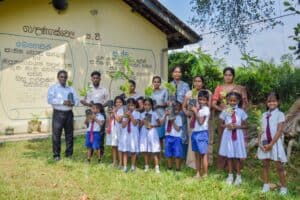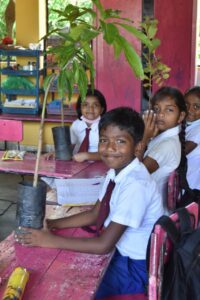
Youth Responding to Climate Change in South Africa

On September 19th, 2020, GNRC South Africa launched the Zimbali Zonke Garden4Life Project at a children’s interfaith day camp. The launch owed to the run-up to the United Nations International Day of Peace. Since its launch, the project has continued to be a platform to share and take action to mitigate climate change.
South Africa is particularly vulnerable to the impacts and effects of climate change. Temperatures are rising, and rainfall is increasing yearly, causing serious problems and damage. The Sustainable Development Goals call for action to protect the planet to ensure that all people enjoy peace and prosperity. The GNRC’s mission and vision of building a better world for children include caring for our earth. We look at how we can offer balanced education to our children and youth to include care for the environment and understanding how climate change affects us. We, at GNRC South Africa, consider knowledge, understanding, and action on climate change as part of our personal commitments to protect the earth.
We commit to learning more about the impacts of climate change and understanding how we can support environmental action locally. It is with this in mind that we started a vegetable garden for our children at the World Assembly of Muslim Youth premises in 2021.
Ms. Saydoon Nisa Sayed
Coordinator, GNRC South Africa
The post Youth Responding to Climate Change in South Africa appeared first on Global Network of Religions for Children.
The post Youth Responding to Climate Change in South Africa appeared first on Arigatou International.

‘Grow trees with Children’ – Sri Lanka

The End Child Poverty  Knowledge Centre, joined hands with the Sarvodaya Shramadana Movement in planting trees to commemorate ECP@10 (10th anniversary of Arigatou International – End Child Poverty).
Knowledge Centre, joined hands with the Sarvodaya Shramadana Movement in planting trees to commemorate ECP@10 (10th anniversary of Arigatou International – End Child Poverty).
The Knowledge Center visited two schools in Galle District where they planted hundreds of trees and distributed tree seedlings among children, parents, teachers and staff and members of Sarvodaya Shramadana Societies to plant a in their gardens. These tree seedlings were carefully selected to be compatible with the ecosystem in the area as well as fruit trees to promote zero hunger. They included Jack Plants, Cashew Plants, Mango Plants and Guava plants.
The tree-planting campaign is being conducted in 25 districts in Sri Lanka and aims to plant more than 2000 plants across the country. Tree planting is part of the wider ECP@10 campaign and aims to grow 1 million trees worldwide as a way of mobilizing our constituencies to face the challenge of climate change and its nexus. with poverty.
The post <strong>‘Grow trees with Children’ – Sri Lanka</strong> appeared first on End Child Poverty.
The post ‘Grow trees with Children’ – Sri Lanka appeared first on Arigatou International.

‘Grow trees with Children’ – Sri Lanka

The End Child Poverty  Knowledge Centre, joined hands with the Sarvodaya Shramadana Movement in planting trees to commemorate ECP@10 (10th anniversary of Arigatou International – End Child Poverty).
Knowledge Centre, joined hands with the Sarvodaya Shramadana Movement in planting trees to commemorate ECP@10 (10th anniversary of Arigatou International – End Child Poverty).
The Knowledge Center visited two schools in Galle District where they planted hundreds of trees and distributed tree seedlings among children, parents, teachers and staff and members of Sarvodaya Shramadana Societies to plant a in their gardens. These tree seedlings were carefully selected to be compatible with the ecosystem in the area as well as fruit trees to promote zero hunger. They included Jack Plants, Cashew Plants, Mango Plants and Guava plants.
The tree-planting campaign is being conducted in 25 districts in Sri Lanka and aims to plant more than 2000 plants across the country. Tree planting is part of the wider ECP@10 campaign and aims to grow 1 million trees worldwide as a way of mobilizing our constituencies to face the challenge of climate change and its nexus. with poverty.
The post <strong>‘Grow trees with Children’ – Sri Lanka</strong> appeared first on End Child Poverty.
The post ‘Grow trees with Children’ – Sri Lanka appeared first on Arigatou International.

Sleepwalking into a Complex Global Emergency

Why we must focus on young people to turn back the tide
THE POLYCRISIS: INTERWOVEN CRISIS IMPACTING THE VULNERABLE
Phrases like ‘disasters’, ‘catastrophes’, ‘calamities’, ‘tragedies’, or ‘emergencies’ no longer sufficiently describe the mega-threats humanity is facing. Rather, we are, because of a series of crises that are ‘interconnected, entwining and worsening one another’ – a polycrisis, sleepwalking into a complex emergency.
The most talked about and visible today of a series of emergencies or disasters are the energy and food crisis caused by Russia’s war on Ukraine. The less visible and less talked about are the multiple wars and conflicts spanning Africa, the Middle East, and Asia, producing millions of refugees, pushing the most vulnerable into a further abyss. The spiraling global inflation generated by short-term stop-gap measures has worsened the already dire situation.
Never before have our planet-unfriendly activities pushed the earth’s ecological systems so far, out of balance—that global and local systems have been rendered endangered, literally hanging on the straws. These multiple, simultaneous, and consecutive harms inflicted on the earth and its inhabitants, have produced unparalleled interlinked dilemmas. The set of solutions to resolve one crisis seems to be worsening others and producing new ones. We have pushed ourselves into the uncertain and ambiguous terrain—and into an intractable polycrisis.
Now, solving the polycrisis by simply repeating, or ‘modelling back’ actions and solutions that produced the present polycrisis is not the smartest thing to do. Challenges such as sexual exploitation and abuse of children, hate crimes, rising virulent forms of political and religious extremism—some of which are produced and propelled by democracies, targeting younger generations, are likely to, if not addressed, combine with traditional risks and challenges, to produce the complex emergencies. 52% of the world’s population is under the age of 30, and in under 10 years, this segment of the population will be leaders, if not already.
The complex emergencies from the polycrisis become inevitable if we ignore 52% of the population. We are sleepwalking into a complex emergency if we do not address, work with, and for the population that will take us into the complex emergency, and that which will inherit most of the problems we will trigger.
Because the G20 platform is primarily an economic policy platform, let’s have this into an economic perspective. A study by Child Fund Alliance estimates that the global economic impacts and costs resulting from the consequences of physical, psychological, and sexual violence against children top $7 trillion. This high cost is a lot much higher than the investment needed to prevent much of that violence. As evidence suggests, prevention pays back better.

An excerpt from the GNRC Secretary General, Dr. Mustafa Y. Ali
Delivered at the G20 Interfaith Forum – 12th December, 2022
The post Sleepwalking into a Complex Global Emergency appeared first on Global Network of Religions for Children.
The post Sleepwalking into a Complex Global Emergency appeared first on Arigatou International.

Sleepwalking into a Complex Global Emergency

Why we must focus on young people to turn back the tide
THE POLYCRISIS: INTERWOVEN CRISIS IMPACTING THE VULNERABLE
Phrases like ‘disasters’, ‘catastrophes’, ‘calamities’, ‘tragedies’, or ‘emergencies’ no longer sufficiently describe the mega-threats humanity is facing. Rather, we are, because of a series of crises that are ‘interconnected, entwining and worsening one another’ – a polycrisis, sleepwalking into a complex emergency.
The most talked about and visible today of a series of emergencies or disasters are the energy and food crisis caused by Russia’s war on Ukraine. The less visible and less talked about are the multiple wars and conflicts spanning Africa, the Middle East, and Asia, producing millions of refugees, pushing the most vulnerable into a further abyss. The spiraling global inflation generated by short-term stop-gap measures has worsened the already dire situation.
Never before have our planet-unfriendly activities pushed the earth’s ecological systems so far, out of balance—that global and local systems have been rendered endangered, literally hanging on the straws. These multiple, simultaneous, and consecutive harms inflicted on the earth and its inhabitants, have produced unparalleled interlinked dilemmas. The set of solutions to resolve one crisis seems to be worsening others and producing new ones. We have pushed ourselves into the uncertain and ambiguous terrain—and into an intractable polycrisis.
Now, solving the polycrisis by simply repeating, or ‘modelling back’ actions and solutions that produced the present polycrisis is not the smartest thing to do. Challenges such as sexual exploitation and abuse of children, hate crimes, rising virulent forms of political and religious extremism—some of which are produced and propelled by democracies, targeting younger generations, are likely to, if not addressed, combine with traditional risks and challenges, to produce the complex emergencies. 52% of the world’s population is under the age of 30, and in under 10 years, this segment of the population will be leaders, if not already.
The complex emergencies from the polycrisis become inevitable if we ignore 52% of the population. We are sleepwalking into a complex emergency if we do not address, work with, and for the population that will take us into the complex emergency, and that which will inherit most of the problems we will trigger.
Because the G20 platform is primarily an economic policy platform, let’s have this into an economic perspective. A study by Child Fund Alliance estimates that the global economic impacts and costs resulting from the consequences of physical, psychological, and sexual violence against children top $7 trillion. This high cost is a lot much higher than the investment needed to prevent much of that violence. As evidence suggests, prevention pays back better.

An excerpt from the GNRC Secretary General, Dr. Mustafa Y. Ali
Delivered at the G20 Interfaith Forum – 12th December, 2022
The post Sleepwalking into a Complex Global Emergency appeared first on Global Network of Religions for Children.
The post Sleepwalking into a Complex Global Emergency appeared first on Arigatou International.






